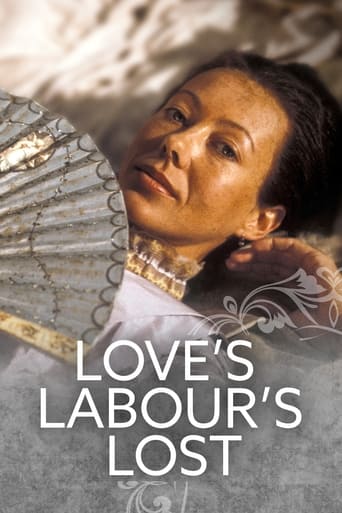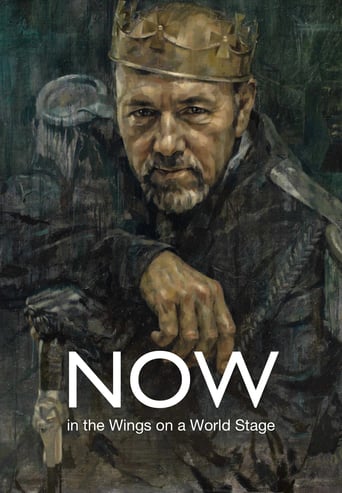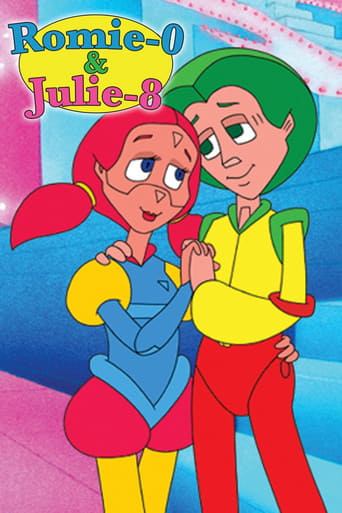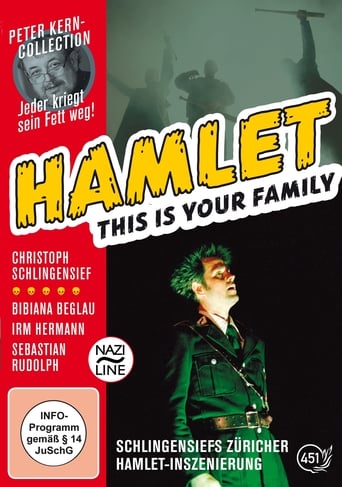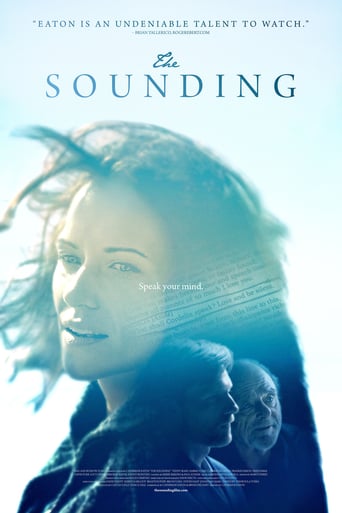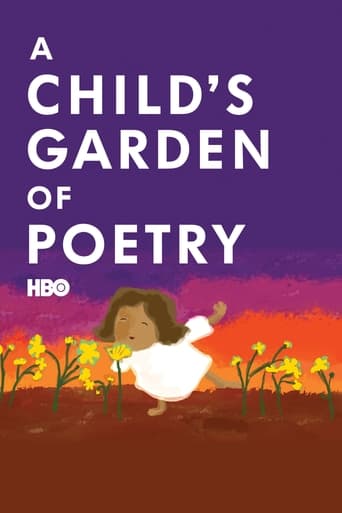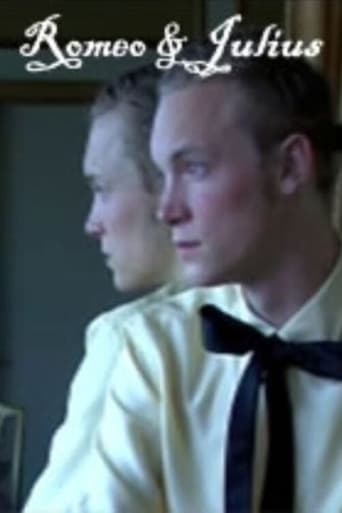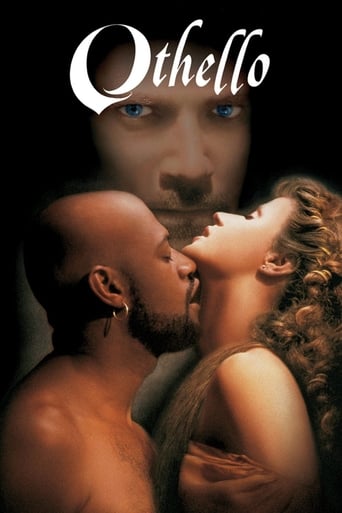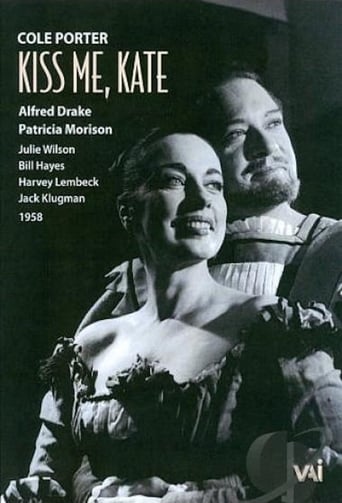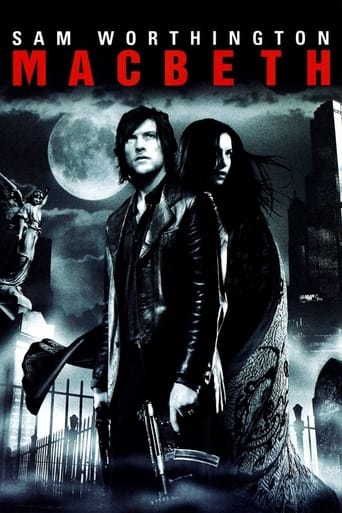Love's Labour's Lost (1985)
When the King of Navarre and three of his cronies swear to spend all their days in study and not to look at any girls, they've forgotten that the daughter of the King of France is coming on a diplomatic visit. And the lady herself and her attendants play merry havoc with their intentions.
Watch Trailer
Cast
Similar titles
Reviews
Truly Dreadful Film
the audience applauded
This is a small, humorous movie in some ways, but it has a huge heart. What a nice experience.
A terrific literary drama and character piece that shows how the process of creating art can be seen differently by those doing it and those looking at it from the outside.
Love's Labour's Lost (1985) (TV) (The BBC version) is one of Shakespeare's early comedies, given a respectful interpretation by the BBC. The film was directed by Elijah Moshinsky.Here's what I copied and pasted from my review of the movie from The Globe Theatre production of LLL:Love's Labour's Lost (Globe Theatre Version) (2010) (V) isn't one of Shakespeare's great comedies. There are four intertwined subplots. One involves the King of Navarre and three of his young courtiers/companions, and the Princess of France and three of her ladies-in-waiting/companions. Another involves a stereotypical Spanish nobleman and his love for a country lass. A third involves the same country lass, who may or may not be in love with a country lad (The lad, Costard, wanders in and out of all the plots.) The fourth plot involves three bourgeois officials--the preacher, the teacher, and the constable. There's also a major role for Moth, the witty servant to Don Armado, the Spaniard. To add to this there are men disguised as "Muscovites," mistaken identities, and a pageant performed by the three bourgeois men.Surprisingly, Love's Labour's Lost is loaded with wordplay. There are endless puns, endless poems, and endless commentary about puns, poems, and words. Shakespeare was warming up. Knowing what we know now, we can sense the genius flexing his mental and verbal muscles—getting ready to give us Much Ado About Nothing and Midsummer Night's Dream.Anyone putting on this play has to deal with a weak premise and an intricate—and not very funny—plot. The BBC series played it straight. "This is Shakespeare's play, and we're going to perform it as he wrote it. If it's not a great play, that's not our fault."As is usual in the BBC productions, the acting was highly professional. The costumes were wonderful, and the sets were excellent. (The BBC sometimes doesn't do much with sets, but this time they did.)The two leads--Jonathan Kent as Ferdinand, King of Navarre and Maureen Lipman as The Princess of France--are excellent actors. However, they were both in their late 30's when the movie was produced. The play is really about young love, and so in that sense they were miscast. However, suspension of disbelief goes a long way, and after a while you just admired them as they demonstrated their acting skills. The Globe Theatre production of LLL was more of a slapstick version, which worked on its own terms. However, if you want to see LLL as you would see it on the stage--as we did, in Stratford, Ontario--this is the version for you.The BBC's Shakespeare productions were made for TV, so, naturally, they work well on the small screen.
This fine production was one of the last in the BBC Shakespeare series. The acting is excellent on all sides; the costumes are lovely; and the sets are very impressive. Mike Gwilym is particularly good as Berowne -- by far the most richly characterized role in the play -- but everyone else, ranging from Maureen Lipman (Princess) to Paul Jesson (Costard), likewise acts at a pleasingly high level. My sole complaint, especially about a production that runs for under two hours, is that there are far too many abridgments and some rather odd rearrangements of bits of the text that are extracted from their original locations. Those alterations are at best unnecessary and at worst rather confusing. Still, they don't detract much from the overall magic of the performances.
This comedy is in fact an anti-comedy because it is tragic, yet it is a gem, a diamond, a beauty deep in the dark of the night. Of course Shakespeare is mocking himself and turning us into foolish turkeys and gullible geese ready to be roasted for some Thanksgiving or Christmas celebration. He does not forget any of his tricks to entertain us and to make us believe he is telling us a happy and funny story.Four gentlemen and four gentle women, on each side one is of royal blood: the perfect structure of four plus four equal eight. But there will be no wedding except for one of the three worthies, who are five plus a woman, which makes them six, the saving gift of Solomon's wisdom, and the happy ones will be Hector/ Armado and Jaquenetta, a country lass, as a sort of killing envoi to the play that was lost anyway from the very title and its three L that sounded like a death toll over, behind and under Plymouth's Burial Hill.But the play is a beauty, a gem and a diamond, not because it is tragic but because it is written in a language that is so beautiful and witty that we lose our wits in no time and we get some loose screws in our brains after two pages. Shakespeare accumulates sonnets and all sorts of other metaphysical poems, as brilliant as John Donne's and his own actually. Just for that pleasure to listen to the most shiny and witty language of the many past centuries, this play should be taught to every child in kindergarten. No use trying in universities: they are too old to even consider love as being a serious game with one's heart and a dangerous hunt for one's soul.But Shakespeare uses disguises tricked and tricky of course because of the masks and the exchanged identifying presents. He also uses a play in the play with five classical heroes, Pompey, Alexander the Great, Hercules, Judas Maccabaeus and Hector of Troy and a very quick intervention of a Helen of Troy to claim her three month pregnancy. Another disrupting three. We should have known, especially after the Three Worthies, the thrice worthy gentleman, and so many triple threefold play that turns awkward and awry.But even Shakespeare did not know how to finish his silly but witty tale. So he had a black-appareled gentleman come and disturb the fest to announce to the royal young lady there that her father the King of France had just died. And in spite of that cold shower of a news the play will find a lighter ending with a song, a sad song that parts the company, with the cuckoo on one side and the owl on the other side, spring and winter, day and night. Life is but a witty farce wrapping up a tragedy in crazy words of dereliction and savagery. The free-wheeling cuckoo becomes a danger: "Cuckoo, cuckoo'- O word of fear," and the watching nocturnal Owl that announces death in the middle of the night becomes a cry of joy: "Tu-whit, To-who'- A merry note".Shakespeare is a genius when he wants to join in the same play the full merriment of young free-floating flotsam and jetsam of aristocratic do-nothing and worth-little social scum and the deepest grief, sorrow, pain and as many tears as possible. He is the best party pooper in the world. And we like him for that, even when he turns the sword around and makes Mercutio string witty remarks on his wound just instants before he falls and dies. Shakespeare will never die or if you prefer he has not yet found his sexton and gravedigger.Dr Jacques COULARDEAU, University Paris 1 Pantheon Sorbonne, University Paris 8 Saint Denis, University Paris 12 Créteil, CEGID
This is a chamber play, with a lot of elaborate verbal humor and a little action but not much.There are reasons this particular Shakespeare play is not put on much in the theater, but make it more suitable for television than usual. We are close in, the faces of engaging personalities fill the screen, the comedy of broken vows, misdirected courtships and thwarted desire works well in TV scale.That we forgive these characters for occasionally going into fits of laughter over puns and paradoxes that we will not ever understand is made possible by the director, Elijah Moshinsky. He has played fast and loose with the BBC/Time-Life ground rules of "either Shakespeare's time or the story's" by setting the action in an 18th Century Never-Neverland decorated delightfully by Watteau. with a touch of the Sir John Soane Museum for flavor. The result is well-paced, inventively staged and balm to the soul.Acting honors go to David Warner as Don Armado. His character is endearingly off-center, without ever attempting a Spanish accent to match his name. There's certainly nothing here in this sweet loony at all like the sinister drip that Warner usually played in films - altogether a wonderful surprise.Berowne is the best-written part, and Mike Gwilym's adenoids make happy sport with the Mercutio/Benedick-style dialog. Maureen Lipman appears more surprised than we are to find her as the Princess of France, but she acquits herself well. Jenny Agutter is delectable as Rosaline, even though her hair and makeup seem at least as appropriate for a small role in "The King and I." Amidst the warm comedy, there is a pang with the sudden shift of tone near the end of the play at Marcade's announcement of a death. The extra resonance is caused by the appearance of the ever-sepulchral Valentine Dyall, age 77, in his farewell to the screen. He represents a link to the past, as his Duke of Burgundy in the Olivier "Henry V" forty years earlier is, and will continue to be, quite memorable."Love's Labour's Lost" is stronger in its influence than its performance history. Mozart's "Cosi fan tutte" picks up the device of lovers in Slavic disguise wooing the wrong women. G&S's "Princess Ida" may play around with the genders, but love trumps monastic scholarship in the same way.In fact, all we usually know about this play is a lot of people aren't sure how to punctuate the title. Now it's possible to make friends with some splendid Shakespeare you are not likely to see on stage. Highly recommended.
